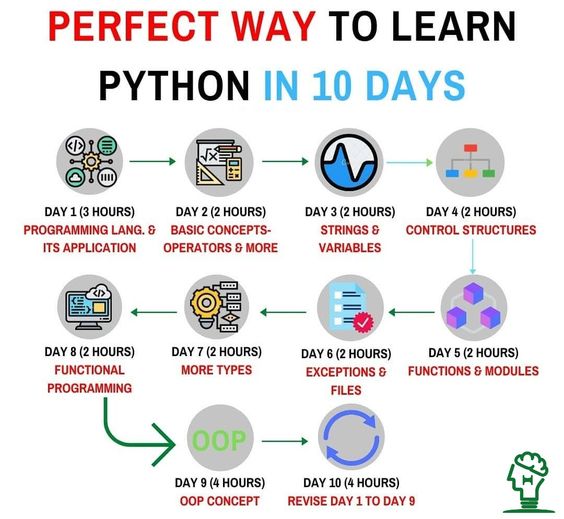Can you learn Python in 7 days?
Can you learn Python in 7 days?
The age-old question: can I learn Python in just 7 days?
Well, my friend, the answer is a resounding "maybe!" While it's certainly possible to make progress with Python in a short amount of time, learning a programming language requires dedication, consistent practice, and a solid foundation. So, before we dive into whether you can learn Python in 7 days, let me clarify what I mean by "learn" and "know."
What does it mean to "learn" Python?
Learning Python means acquiring a basic understanding of its syntax, data structures, control flows, functions, and object-oriented programming. You'll need to grasp the concepts, terminology, and best practices for writing clean, efficient code.
What's the minimum amount of time required to learn Python?
Assuming you're new to programming, I'd estimate that a beginner should spend at least 3-6 months (around 1-2 hours per day) to develop a solid foundation in Python. This timeframe allows you to:
Learn the basics: variables, data types, control structures, functions, and object-oriented programming. Practice writing code: complete exercises, projects, and challenges from online resources or coding platforms. Develop problem-solving skills: debug your code, identify errors, and refine your approach.Now, about those 7 days...
While it's impossible to become proficient in Python in just 7 days, you can still make significant progress. Here's a possible scenario:
Spend the first day learning the basics of Python syntax, data types, and basic control structures. On the second day, explore functions and modules. You'll start to see how these building blocks can help you write more efficient code. Over the next few days (3-5), work on small projects or exercises that focus on specific topics, such as: Data manipulation with Pandas Web scraping with BeautifulSoup Machine learning with scikit-learnThe 7-day challenge:
To make the most of your 7-day "learning sprint," I recommend the following:
Choose a project or exercise that resonates with you, allowing you to apply what you've learned so far. Spend about 30 minutes each day learning new concepts and practicing coding. Take regular breaks (5-10 minutes) to stretch, relax, and recharge. Review your progress daily, focusing on what you've achieved and what areas need improvement.Conclusion:
While it's unrealistic to expect mastery in just 7 days, you can still make substantial progress with Python during this timeframe. Remember that learning a programming language is a long-term investment, and consistent effort will yield better results than trying to cram everything into a short period.
If you're willing to put in the time and dedication, I encourage you to take the 7-day challenge! You might be surprised at how much you can accomplish in such a short span. Happy coding!
How to learn python easily reddit

Learning Python can be a fascinating journey! Here's some valuable advice on how to learn Python easily from the Reddit community:
Step 1: Start with the Basics
Begin by understanding the fundamental concepts of Python, such as variables, data types, control structures, functions, and modules. Watch videos or tutorials that provide a comprehensive overview of the language. Sites like Codecademy, FreeCodeCamp, and DataCamp offer excellent resources.Step 2: Practice with Simple Programs
Start by writing simple programs that solve everyday problems or automate tasks. Practice is key! The more you code, the more comfortable you'll become with Python's syntax and structure.Step 3: Join Online Communities and Forums
Reddit has an amazing community dedicated to learning and teaching Python. r/learnpython and r/Python are excellent places to ask questions, share resources, and get feedback from fellow learners. Participate in online forums like Stack Overflow, Quora, and GitHub discussions to stay updated on best practices and common pitfalls.Step 4: Work with Real-World Projects
Apply your newfound skills by working on real-world projects that interest you, such as: Automating tasks with scripts Building games or simulations Scraping web data or crawling websites Analyzing datasets or building machine learning modelsStep 5: Read Books and Documentation
"Python Crash Course" by Eric Matthes is a great resource for beginners. The official Python documentation is an excellent reference guide for syntax, built-in functions, and libraries.Step 6: Learn from Others' Code
Study open-source projects on GitHub or Bitbucket to see how experienced developers structure their code. Use online platforms like LeetCode, HackerRank, or Codewars to solve problems and learn from others' solutions.Step 7: Get Feedback and Stay Patient
Share your code with the community and ask for feedback. This will help you identify areas for improvement. Learning a programming language takes time and effort. Don't be discouraged by setbacks – stay patient, persistent, and keep practicing!Additional Tips:
Learn to use an Integrated Development Environment (IDE) like PyCharm, Visual Studio Code, or Spyder to streamline your coding experience. Practice regularly, even if it's just 15-20 minutes a day. Consistency is key! Take online courses or attend meetups/workshops to expand your network and learn from experts.Remember, learning Python is a journey, not a destination! Stay curious, stay patient, and you'll become proficient in no time.





























